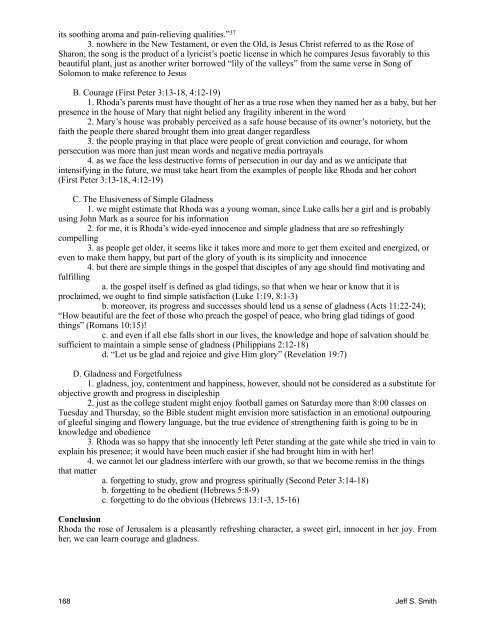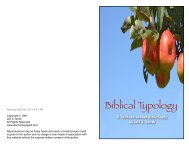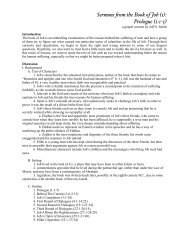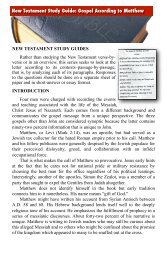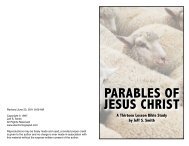Character Studies - ElectronicGospel
Character Studies - ElectronicGospel
Character Studies - ElectronicGospel
- No tags were found...
Create successful ePaper yourself
Turn your PDF publications into a flip-book with our unique Google optimized e-Paper software.
its soothing aroma and pain-relieving qualities.” 373. nowhere in the New Testament, or even the Old, is Jesus Christ referred to as the Rose ofSharon; the song is the product of a lyricist’s poetic license in which he compares Jesus favorably to thisbeautiful plant, just as another writer borrowed “lily of the valleys” from the same verse in Song ofSolomon to make reference to JesusB. Courage (First Peter 3:13-18, 4:12-19)1. Rhoda’s parents must have thought of her as a true rose when they named her as a baby, but herpresence in the house of Mary that night belied any fragility inherent in the word2. Mary’s house was probably perceived as a safe house because of its owner’s notoriety, but thefaith the people there shared brought them into great danger regardless3. the people praying in that place were people of great conviction and courage, for whompersecution was more than just mean words and negative media portrayals4. as we face the less destructive forms of persecution in our day and as we anticipate thatintensifying in the future, we must take heart from the examples of people like Rhoda and her cohort(First Peter 3:13-18, 4:12-19)C. The Elusiveness of Simple Gladness1. we might estimate that Rhoda was a young woman, since Luke calls her a girl and is probablyusing John Mark as a source for his information2. for me, it is Rhoda’s wide-eyed innocence and simple gladness that are so refreshinglycompelling3. as people get older, it seems like it takes more and more to get them excited and energized, oreven to make them happy, but part of the glory of youth is its simplicity and innocence4. but there are simple things in the gospel that disciples of any age should find motivating andfulfillinga. the gospel itself is defined as glad tidings, so that when we hear or know that it isproclaimed, we ought to find simple satisfaction (Luke 1:19, 8:1-3)b. moreover, its progress and successes should lend us a sense of gladness (Acts 11:22-24);“How beautiful are the feet of those who preach the gospel of peace, who bring glad tidings of goodthings” (Romans 10:15)!c. and even if all else falls short in our lives, the knowledge and hope of salvation should besufficient to maintain a simple sense of gladness (Philippians 2:12-18)d. “Let us be glad and rejoice and give Him glory” (Revelation 19:7)D. Gladness and Forgetfulness1. gladness, joy, contentment and happiness, however, should not be considered as a substitute forobjective growth and progress in discipleship2. just as the college student might enjoy football games on Saturday more than 8:00 classes onTuesday and Thursday, so the Bible student might envision more satisfaction in an emotional outpouringof gleeful singing and flowery language, but the true evidence of strengthening faith is going to be inknowledge and obedience3. Rhoda was so happy that she innocently left Peter standing at the gate while she tried in vain toexplain his presence; it would have been much easier if she had brought him in with her!4. we cannot let our gladness interfere with our growth, so that we become remiss in the thingsthat mattera. forgetting to study, grow and progress spiritually (Second Peter 3:14-18)b. forgetting to be obedient (Hebrews 5:8-9)c. forgetting to do the obvious (Hebrews 13:1-3, 15-16)ConclusionRhoda the rose of Jerusalem is a pleasantly refreshing character, a sweet girl, innocent in her joy. Fromher, we can learn courage and gladness.168! Jeff S. Smith


